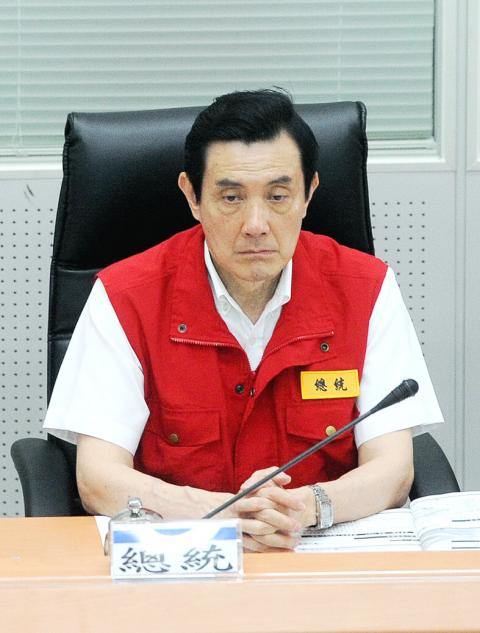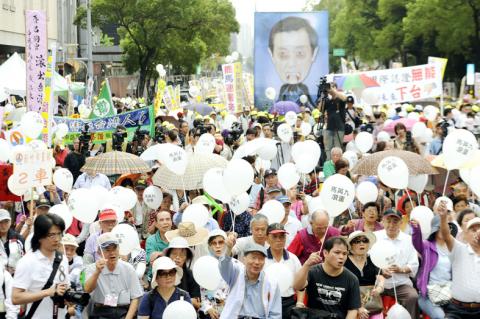The Democratic Progressive Party (DPP) yesterday urged President Ma Ying-jeou (馬英九) to steer the nation back in the right direction — the anniversary of first and Ma’s second-term inaugurations — but said that now is not the right time to impeach him.
“While we think Ma deserves to be recalled, now is not the right time to do so because the country is embroiled in a diplomatic row with the Philippines,” DPP Chairman Su Tseng-chang (蘇貞昌) told a press conference, referring to Taipei’s engagement with Manila over the shooting of Taiwanese fisherman Hung Shih-cheng (洪石成) by Philippine Coast Guard personnel on May 9.
The DPP said that the diplomatic tussle with the Philippines was why it was not supporting the Taiwan Solidarity Union (TSU) in the latter’s proposal to impeach the president, as it did last year.

Photo: Wang Min-wei, Taipei Times
Reviewing Ma’s performance over the past five years, the DPP said the nation has been a chaos under his rule and submitted an appeal listing eight issues Ma should tackle in the remaining three years of his term.
The party urged Ma to halt the construction of the controversial Fourth Nuclear Power Plant in New Taipei City’s (新北市) Gongliao District (貢寮) and hold a national referendum on the plant.
The president should also conduct a comprehensive review of Taiwan’s economic situation and structure before putting forward a long-term recovery plan to improve national competitiveness, Su said.

Photo: Chen Chih-chu, Taipei Times
The DPP also called for the establishment of a 12-year compulsory education system, the formulation of a sustainable and fair pension system and the implementation of a 10-year long-term care program — a national program initiated by the former DPP administration that was shelved after Ma took office — to look after the needs of the nation’s aging population.
It was also imperative to review the nation’s administrative partitioning and national planning since the number of special municipalities would increase to six next year from the original two in 2010, meaning that new issues in areas such as local finances would likely emerge, Su said.
Finally, the DPP demanded that Ma fight corruption, reform the judicial system and bolster defense and foreign policy.
Former DPP chairperson Tsai Ing-wen (蔡英文) said on her Facebook page yesterday that Ma’s seemingly ambitious reform efforts were “fast-food” reforms that only touch upon the surface of a problem without going into the core of the matter.
Tsai urged Ma to listen to the public as he completes his term and tackle Taiwan’s structural challenges from a long-term perspective.
Meanwhile, the TSU told protesters at a rally in front of the Legislative Yuan in Taipei that it would submit a legislative proposal to recall the president for his poor governance during the past five years.
TSU Chairman Huang Kun-huei (黃昆輝) said the TSU launched a recall petition a year ago that has collected about 830,000 signatures.
“With only three legislators, the TSU caucus is small, but it is confident it will winn support from the public and lawmakers from other parties,” Huang told hundreds of protesters amid the honking of car horns by taxi drivers to show their support of the rally.
A DPP-TSU joint motion to impeach Ma was voted off the agenda by the legislature’s Procedure Committee in May last year, five days before the end of Ma’s first term.
The Presidential and Vice Presidential Election and Recall Act (總統副總統選舉罷免法) stipulates that a recall proposal can only be made with the support of at least one-quarter of the total members of the legislature and can only pass if it gets the approval of at least two-thirds of all lawmakers.
The act further states that a president or vice president who has not been in their position for a full year may not be recalled.
The TSU listed 10 reasons for launching a new recall campaign, including Ma’s failure to deliver on his campaign pledges, his pro-China position, poor economic and financial performance, failure to fight corruption and oppression of media freedom under his tenure, among others.
TSU Secretary-General Lin Chih-chia (林志嘉) said the party has also launched an online petition and hoped to collect 1 million signatures by next month.
In related news, DPP spokesperson Lin Chun-hsien (林俊憲) said the government must hold its officials — in particular Minister of Finance Chang Sheng-ford (張盛和) — responsible for the capital gains tax on securities transactions accountable for their the hasty and flawed implementation of the policy.
The Ma administration and the Chinese Nationalist Party (KMT) ignored the DPP’s proposal and insisted on adopting the KMT’s “inferior” initiative, which introduced a 8,500-point threshold on the TAIEX for the tax to be implemented, Lin said.
“Less than five months after the tax proposal was passed, the administration is now considering revising the regulations again. Someone has to be held accountable for this mess,” Lin said.
Separately, DPP members said that Ma had fallen asleep during a press conference at the Central Disaster Emergency Operation Center to oversee state flood-prevention efforts, adding that the nap had been caught on film.

SECURITY: As China is ‘reshaping’ Hong Kong’s population, Taiwan must raise the eligibility threshold for applications from Hong Kongers, Chiu Chui-cheng said When Hong Kong and Macau citizens apply for residency in Taiwan, it would be under a new category that includes a “national security observation period,” Mainland Affairs Council (MAC) Minister Chiu Chui-cheng (邱垂正) said yesterday. President William Lai (賴清德) on March 13 announced 17 strategies to counter China’s aggression toward Taiwan, including incorporating national security considerations into the review process for residency applications from Hong Kong and Macau citizens. The situation in Hong Kong is constantly changing, Chiu said to media yesterday on the sidelines of the Taipei Technology Run hosted by the Taipei Neihu Technology Park Development Association. With

CARROT AND STICK: While unrelenting in its military threats, China attracted nearly 40,000 Taiwanese to over 400 business events last year Nearly 40,000 Taiwanese last year joined industry events in China, such as conferences and trade fairs, supported by the Chinese government, a study showed yesterday, as Beijing ramps up a charm offensive toward Taipei alongside military pressure. China has long taken a carrot-and-stick approach to Taiwan, threatening it with the prospect of military action while reaching out to those it believes are amenable to Beijing’s point of view. Taiwanese security officials are wary of what they see as Beijing’s influence campaigns to sway public opinion after Taipei and Beijing gradually resumed travel links halted by the COVID-19 pandemic, but the scale of

A US Marine Corps regiment equipped with Naval Strike Missiles (NSM) is set to participate in the upcoming Balikatan 25 exercise in the Luzon Strait, marking the system’s first-ever deployment in the Philippines. US and Philippine officials have separately confirmed that the Navy Marine Expeditionary Ship Interdiction System (NMESIS) — the mobile launch platform for the Naval Strike Missile — would take part in the joint exercise. The missiles are being deployed to “a strategic first island chain chokepoint” in the waters between Taiwan proper and the Philippines, US-based Naval News reported. “The Luzon Strait and Bashi Channel represent a critical access

Pope Francis is be laid to rest on Saturday after lying in state for three days in St Peter’s Basilica, where the faithful are expected to flock to pay their respects to history’s first Latin American pontiff. The cardinals met yesterday in the Vatican’s synod hall to chart the next steps before a conclave begins to choose Francis’ successor, as condolences poured in from around the world. According to current norms, the conclave must begin between May 5 and 10. The cardinals set the funeral for Saturday at 10am in St Peter’s Square, to be celebrated by the dean of the College